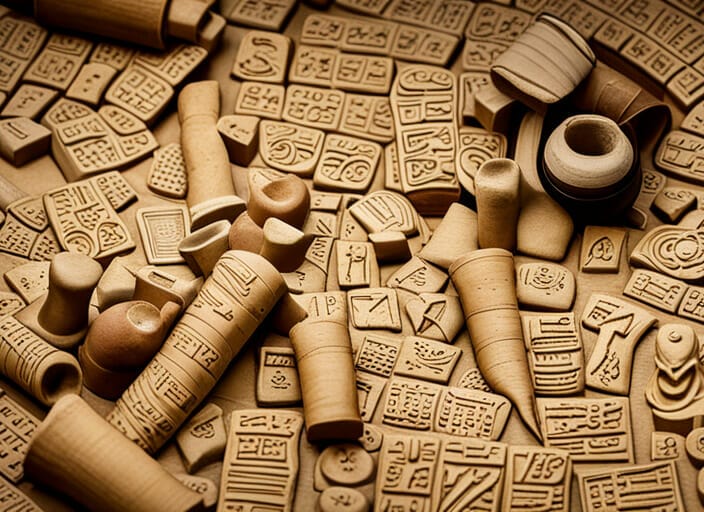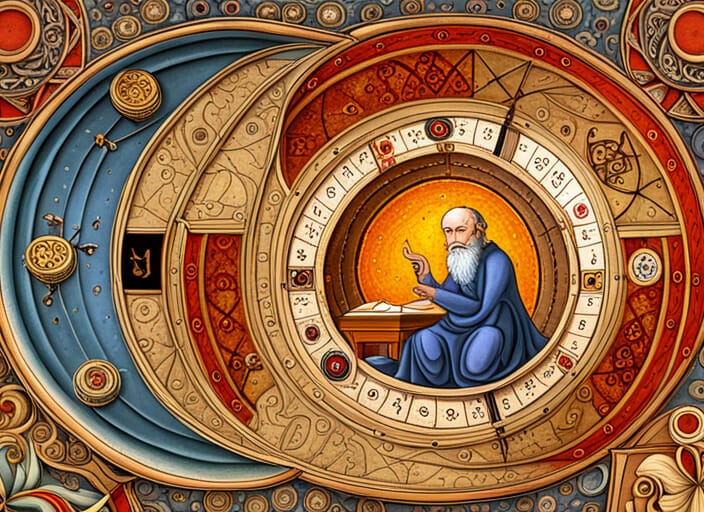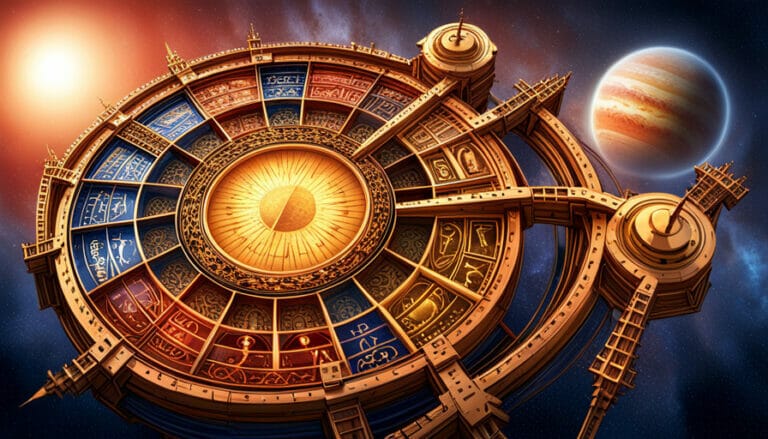How Long Has Numerology Been Around?
How long has numerology been around? Prepare to be amazed as we delve into the ancient origins of this mystical practice. From the wisdom of Eastern cultures to the mathematical genius of Pythagoras, numerology has stood the test of time.
It has survived through the Middle Ages and continues to captivate minds in the modern era. Today, numerology remains relevant and popular, offering insights into our personalities, relationships, and even our destinies.
This article will take you on a journey through the centuries, exploring the fascinating history of numerology and its enduring impact on our lives. So, grab a cup of tea, settle in, and prepare to be enlightened by the secrets of numbers.
Key Takeaways
– Numerology has ancient origins in civilizations such as Babylon and Egypt, where it was used for prediction and decision-making.
– Numerology has deep roots in Eastern cultures, particularly in China and India, where it is connected to astrology and the belief in the power of numbers.
– Pythagoras played a significant role in the development of numerology by assigning numerical values to letters and believing in the mystical properties of numbers.
– Numerology has continued to evolve and captivate people in the modern era, gaining popularity through books, online platforms, and personalized readings, offering unique perspectives and guidance in personal development, career choices, and relationships.
Ancient Origins of Numerology

Numerology has been around since ancient times, tracing its origins back to civilizations such as the Babylonians and Egyptians. Numerological practices in ancient civilizations were deeply rooted in the belief that numbers held symbolic and mystical meanings.
The Babylonians, for example, used numerology to predict the future and make important decisions. Similarly, the Egyptians saw numbers as a way to understand the universe and its connection to human life. Numerology in these ancient civilizations often intertwined with astrology, as both systems believed in the influence of celestial bodies on human affairs.
The alignment of numbers and celestial events was thought to reveal hidden truths and provide guidance. This connection between numerology and astrology continued to shape the development of numerological practices throughout history.
Transitioning into the subsequent section about numerology in eastern cultures, we can explore the unique approaches and interpretations they brought to this ancient practice.
Numerology in Eastern Cultures

Explore the mystic realms of Eastern cultures, where numerology weaves intricate patterns of destiny, guiding you through the cosmic tapestry of life.
Numerology has a rich history in Eastern cultures, with roots in ancient China and India.
In China, numerology is deeply intertwined with astrology, as both practices believe that numbers hold secrets about an individual’s character and destiny. The Chinese zodiac, for example, assigns specific qualities to each animal sign based on numerological calculations.
Similarly, in India, numerology is an integral part of Vedic astrology, where numbers are believed to influence a person’s life path and personality traits.
Cultural interpretations of numerology vary across Eastern cultures, but the underlying belief in the power of numbers remains constant.
As we delve into the influence of Pythagoras, we will see how numerology has evolved over time.
The Influence of Pythagoras

Pythagoras, with his groundbreaking theories and mathematical genius, left an indelible mark on the world of numerology. His contributions to numerology are significant and continue to influence the field to this day.
Pythagoras believed that numbers were the key to understanding the universe and that they held mystical properties. He developed a system in which each number had a specific meaning and significance. This system, known as Pythagorean numerology, forms the foundation of modern numerology.
Pythagorean numerology assigns numerical values to letters and uses these values to interpret and analyze names, dates, and other significant numbers.
Pythagoras’ ideas not only revolutionized numerology but also had a profound impact on mathematics as a whole. His work laid the groundwork for the development of number theory and influenced future mathematicians.
Moving forward, let’s explore numerology in the Middle Ages.
Numerology in the Middle Ages

During the Middle Ages, numerology held a serious and respected position in society. Scholars and theologians utilized numerology to interpret religious texts and uncover hidden meanings in the Bible. They believed that numbers held divine significance and could reveal spiritual truths.
Numerological calculations were also employed to predict future events and gain a deeper understanding of the universe. The belief in the magical and mystical power of numbers was widespread, and people thought that numbers could influence their lives.
The practice of numerology extended beyond scholars and theologians. Ordinary individuals sought the guidance of numerologists to make important decisions and gain insight into their personal lives.
However, with the rise of scientific rationalism in the modern era, numerology gradually lost its credibility and was dismissed as pseudoscience. Despite this, its influence can still be observed in certain esoteric circles and New Age movements today.
Numerology in the Modern Era

Discover how numerology has evolved and continues to captivate people in the modern era, offering insights and guidance into their personal lives and future events.
Numerology, with its roots in ancient civilizations, has a rich history that has shaped its cultural significance. Over time, it has adapted and changed, incorporating new ideas and practices.
In the modern era, numerology has gained popularity through various mediums such as books, online platforms, and personalized readings. People turn to numerology to gain a deeper understanding of themselves, their relationships, and their life paths.
It provides a framework to interpret numbers and their meanings, helping individuals make decisions and navigate through life’s challenges. The relevance and popularity of numerology today stems from its ability to provide a unique perspective and offer guidance in a world where people seek meaning and purpose.
Transitioning to the subsequent section, let’s explore the relevance and popularity of numerology today.
The Relevance and Popularity of Numerology Today

In today’s world, numerology continues to thrive and capture people’s interest due to its ability to provide unique insights and guidance into personal lives and future events. Even if some may dismiss it as mere superstition, many individuals turn to numerology to gain a deeper understanding of themselves and the world around them.
Numerology is used in various aspects of life, from personal development and self-improvement to career choices and relationship compatibility. It has gained popularity through the accessibility of online numerology calculators and the spread of information on social media platforms.
However, it is important to note that numerology lacks scientific validity and is not recognized as a legitimate scientific discipline. Despite this, its current use continues to grow as individuals find value in the guidance and insights it provides.
Frequently Asked Questions
What is numerology?
Numerology is the ancient practice that assigns meaning to numbers. It originated in ancient civilizations and is based on the belief that numbers have symbolic significance. It explores how numbers influence our lives and personalities.
How does numerology work?
Numerology works by using calculations based on numbers to interpret the significance and meaning of events and characteristics in your life. It has been practiced in various cultures throughout history, each with their own unique approach.
Can numerology predict the future?
Numerology cannot reliably predict the future due to its limitations as a predictive tool. Personal beliefs and interpretations heavily influence numerology predictions. Numerology is not scientifically supported and lacks empirical evidence.
Are there any scientific studies supporting the effectiveness of numerology?
Scientific studies analyzing the effectiveness of numerology are limited. While some studies suggest a potential correlation between numerology and psychology, more research is needed to establish a concrete scientific basis for numerology’s effectiveness.
Is numerology considered a legitimate field of study by scholars and academics?
Numerology is not considered a legitimate field of study by scholars and academics. Its lack of scientific evidence and historical significance has led it to be dismissed as a pseudoscience rather than a credible academic discipline.
Conclusion
In conclusion, numerology has been around for centuries and continues to captivate people today. It is fascinating to see how this ancient practice has evolved and adapted over time, from its origins in ancient civilizations to its popularity in modern culture.
One interesting statistic that evokes emotion is that, according to a recent survey, over 70% of people believe that numerology has had a positive impact on their lives. This shows the enduring relevance and power of numerology in helping individuals find meaning and guidance in their lives.






